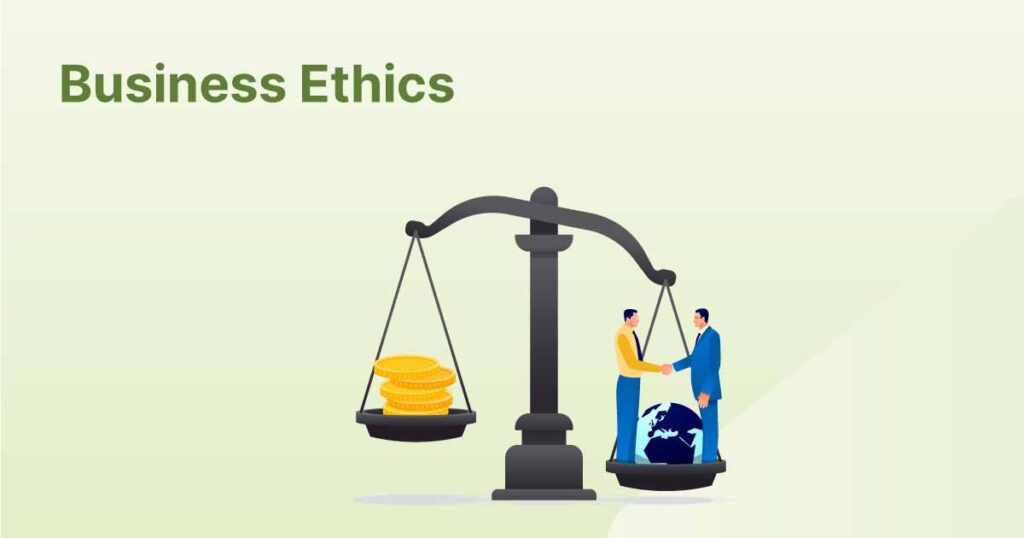Ethical behavior and decision-making are crucial for maintaining a company’s reputation, building trust with customers and stakeholders, and ensuring long-term success. This blog post delves into the essence of business ethics, why it matters, and how young entrepreneurs can apply ethical principles in their ventures.
What is Business Ethics?

Business ethics refers to the moral principles and standards that guide behavior in the world of business. It involves applying ethical values to business activities, decisions, and policies. These values include honesty, integrity, fairness, respect, and responsibility. Business ethics ensures that companies operate in a way that is not only legally compliant but also morally sound.
Why Business Ethics Matter
- Building Trust and Reputation: Trust is the foundation of any successful business relationship. Companies that consistently demonstrate ethical behavior build trust with their customers, employees, investors, and the broader community. This trust translates into a strong reputation, which is invaluable in a competitive market.
- Long-term Success: Ethical companies tend to perform better in the long run. They attract loyal customers, dedicated employees, and committed investors. Ethical practices reduce the risk of legal issues and scandals that can damage a company’s financial health and reputation.
- Employee Satisfaction and Retention: A strong ethical culture fosters a positive work environment. Employees are more likely to feel valued and respected, leading to higher job satisfaction and retention rates. Ethical companies attract top talent who want to work for organizations that align with their personal values.
- Customer Loyalty: Consumers today are more informed and socially conscious. They prefer to support businesses that reflect their values. Ethical behavior in business practices, such as fair treatment of employees and sustainable sourcing, resonates with customers and fosters loyalty.
- Compliance with Laws and Regulations: Adhering to ethical standards ensures compliance with laws and regulations. This minimizes the risk of legal penalties and sanctions. Ethical companies are proactive in understanding and following the legal requirements relevant to their industry.
How to Apply Business Ethics in Your Venture
- Define Your Values: Start by defining the core values that will guide your business. These values should reflect your commitment to ethical behavior. Common values include integrity, transparency, accountability, and respect. Clearly communicate these values to your team and stakeholders.
- Develop a Code of Ethics: A code of ethics is a formal document that outlines the ethical standards and expectations for your business. It should cover areas such as employee conduct, customer interactions, supplier relationships, and compliance with laws. Ensure that all employees understand and commit to this code.
- Lead by Example: Ethical behavior starts at the top. As a leader, you must model the ethical standards you expect from your team. Demonstrate integrity, fairness, and transparency in your decisions and actions. Your behavior sets the tone for the entire organization.
- Foster an Ethical Culture: Create an environment where ethical behavior is encouraged and rewarded. Provide training and resources to help employees understand and apply ethical principles. Encourage open communication and provide channels for reporting unethical behavior without fear of retaliation.
- Make Ethical Decisions: When faced with difficult decisions, consider the ethical implications. Ask yourself questions like: Is this decision fair to all parties involved? Does it align with our values? Will it build or damage trust? Strive to make decisions that are not only legally compliant but also morally sound.
- Engage in Corporate Social Responsibility (CSR): Corporate social responsibility involves going beyond profit-making to contribute positively to society. This can include sustainable business practices, charitable donations, community involvement, and ethical sourcing. CSR initiatives enhance your company’s reputation and demonstrate your commitment to ethical behavior.
- Monitor and Review: Regularly assess your business practices to ensure they align with your ethical standards. Solicit feedback from employees, customers, and other stakeholders. Be open to making changes and improvements as needed.
Real-Life Examples of Business Ethics
- Patagonia: Patagonia, an outdoor clothing company, is known for its commitment to environmental sustainability. The company uses recycled materials, supports environmental causes, and encourages customers to buy only what they need. Patagonia’s ethical practices have earned it a loyal customer base and a strong reputation.
- Ben & Jerry’s: Ben & Jerry’s, the ice cream manufacturer, is dedicated to social and environmental causes. The company sources Fairtrade-certified ingredients, supports various social justice initiatives, and implements sustainable business practices. Ben & Jerry’s commitment to ethics has helped build a positive brand image.
- Starbucks: Starbucks emphasizes ethical sourcing and fair trade practices. The company ensures that the coffee it buys is ethically sourced and that farmers receive fair compensation. Starbucks also invests in community development and environmental sustainability, reinforcing its ethical commitment.
Closing Remarks
Business ethics are not just about avoiding legal troubles or bad press; they are about building a sustainable and successful business. By adhering to ethical principles, companies can build trust, enhance their reputation, and ensure long-term success. For young entrepreneurs, understanding and applying business ethics is crucial for creating ventures that are not only profitable but also responsible and respected. Start by defining your values, developing a code of ethics, leading by example, and fostering an ethical culture. Remember, ethical behavior is good business.

